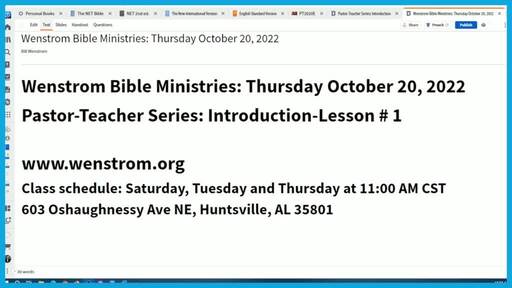Pastor-Teacher-Introduction
Wenstrom Bible Ministries
Pastor-Teacher Bill Wenstrom
Thursday October 20, 2022
Pastor-Teacher Series: Introduction
Lesson # 1
The pastor-teacher is a male church age believer who at the moment of justification and by divine appointment has been given the spiritual gift and authority to communicate the Word of God to his fellow believer priests in the royal family of God who have been assigned to him by God.
He is to exercise this authority in order to further the spiritual growth of his congregation to Christ-likeness.
Every believer in the church age has been assigned to a pastor-teacher without exception (1 Pet. 5:1-4).
Every believer without exception has been assigned to a pastor-teacher who has charge over them in the Lord (1 Thessalonians 5:12-13).
The pastor has been delegated authority from the Lord Jesus Christ.
He is the human instrument used by God to communicate His Word.
The pastor-teacher has four responsibilities that are the means by which he tends and shepherds the flock of God: (1) Study (2 Tim. 2:15) (2) Teach (1 Tim. 4:13) (3) Pray (Acts 6:1-4) (4) Set an Example (Phlp. 3:17; 2 Thess. 3:7, 9; 1 Tim. 4:12; Titus 2:7; 1 Pet. 5:3).
The spiritual growth of each individual believer is dependent upon that which the pastor-teacher provides, namely, the Word of God, which he is to communicate (Eph. 4:7-16).
God has given the spiritual gift of pastor-teacher to men only (1 Timothy 2:11-14; 3:2; 2 Timothy 2:2).
According to the Scripture a woman is to never exercise authority over a man (1 Timothy 2:11-14).
If a pastor loves the Lord and the Lord’s flock, he will feed them (John 21:15-17).
The pastor who is diligent in feeding the flock of God are to be highly esteemed (1 Thessalonians 5:12-13).
The congregation is to imitate their conduct, which is a result of applying that which they teach their congregation (Hebrews 13:7).
The congregation is to submit to their spiritual authority since they keep watch over the souls of the congregation (Hebrews 13:17).
The pastor is to make the Word of God available on a daily basis to the congregation.
Our Lord set the example for the pastor-teacher in the church age by teaching daily in the Temple (Matt. 26:55; Mark 14:49; Luke 19:47).
He is to be repetitious in his teaching since he is the believer’s spiritual drill instructor.
Just like drill instructor in the military is repetitious in training troops in the use of their weapons for combat so the pastor-teacher is to be repetitious in training his spiritual troops in their use of the spiritual weapon (the Word of God) for spiritual combat (Phlp. 3:1; 2 Pet. 3:1-2).
No accusation against a pastor should ever be received unless there are two or more witnesses (1 Timothy 5:19).
Although the pastor-teacher is the spiritual authority in the local assembly, he is not to lord his authority over the congregation.
He is to adhere to the principle of spiritual authority operate, namely, humility.
The pastor’s humility is expressed through his dedicated, self-sacrifice and service to the congregation by study, teaching and praying, which provides the congregation their spiritual food and protection from the kingdom of darkness (Matthew 20:24-28; John 13:1-17).
His authority is solely derived from the Scriptures.
His policies are to be solely are to be derived from the mystery doctrines for the church age.
He is not to employ any Madison Avenue techniques to get people to come to his church.
He is not to institute programs to attract parishioners but is simply to communicate the Word of God.
The Word of God is to be the attraction.
The pastor is not to be looked down upon because of his youth or age (1 Timothy 4:12).
The man with the gift of pastor-teacher is not promoted to the office of pastor-teacher until he first demonstrates over a period of time his Christ-like character in a local assembly and his obedience to another pastor’s authority (1 Timothy 3:1-7).
The pastor is also under stricter discipline because of his position of authority and responsibility (James 3:1).
He should be supported financially by his local assembly or his flock (Gal. 6:6; 1 Cor. 9:7).
He will be rewarded for his faithful service at the Bema Evaluation of the church (1 Corinthians 9:24-27; 1 Thessalonians 2:19-20; 1 Peter 5:4).
